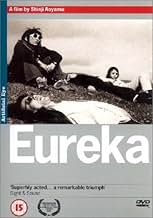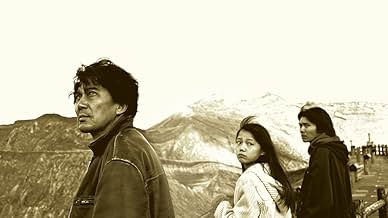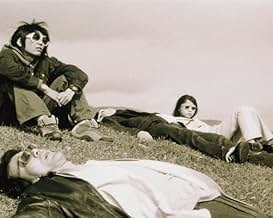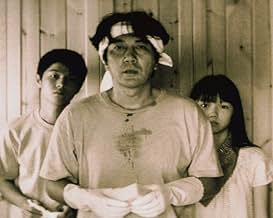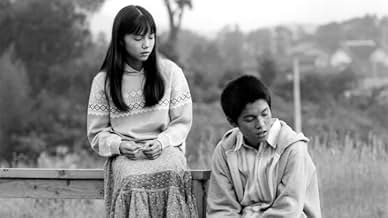IMDb RATING
7.7/10
4.5K
YOUR RATING
The traumatized survivors of a murderous bus hijacking come together and take a road trip to attempt to overcome their damaged selves. Meanwhile a serial killer is on the loose.The traumatized survivors of a murderous bus hijacking come together and take a road trip to attempt to overcome their damaged selves. Meanwhile a serial killer is on the loose.The traumatized survivors of a murderous bus hijacking come together and take a road trip to attempt to overcome their damaged selves. Meanwhile a serial killer is on the loose.
- Awards
- 4 wins & 2 nominations
- Director
- Writer
- All cast & crew
- Production, box office & more at IMDbPro
Storyline
Did you know
- TriviaThe brother and sister in the film are played by real life brother and sister Aoi Miyazaki and Masaru Miyazaki.
- Quotes
Makoto Sawai: Do you think one can live only for others?
Featured review
Some people have a disliking for Japanese cinema because the movies tend to be slow paced, minimalistic. If you're one of them - skip EUREKA is all you need to know. The movie moves along at a snail's pace on Sunday - at 90 minutes most movies are just coming to their explosive and or dramatic climax, but at that point I was still wondering what Eureka was about. 2 hours later the movie finally finishes - and I was still wondering what it was all about.
EUREKA is a movie of epic length, that raises other challenging questions like "Why is it 3.5 hours long?", "Why is it black and white?", "Is this all going somewhere?" and "Is it nearly finished yet?". Clearly director Shinji Aoyama wants his movie to make us think. And in 3.5 hours of black and white imagery and minimal dialogue, your mind certainly does have ample opportunity to wander.
Maybe I should have checked the "Director's Statement" that is included on the UK DVD before watching the movie. Then I'd have known what he was trying to say, and could have spent my time deciding if he said it effectively instead. Whether that would have been more fun or less I don't know though.
Not to say that I didn't enjoy watching EUREKA - for most of the run time I did. It's very well acted, has some good cinematography and is generally quite unusual. I'd have preferred it to have been shorter though, or had more going on - even colour photography would have helped to keep my attention on the screen with a little less effort.
I do think it's a good movie though, but... it just didn't need to be 3.5 hours to make its point or build its characters. Or maybe it did need 3.5 hours to do that, but Shinji Aoyama used his time badly - because at the end I still didn't really have a grasp on who the characters were 'deep down', or what the point of sharing their story with us was. Perhaps it's just that it's a movie aimed for better minds than mine to truly appreciate though. Certainly the length and style are going to keep any hopes of mainstream appreciation at bay.
EUREKA is a movie of epic length, that raises other challenging questions like "Why is it 3.5 hours long?", "Why is it black and white?", "Is this all going somewhere?" and "Is it nearly finished yet?". Clearly director Shinji Aoyama wants his movie to make us think. And in 3.5 hours of black and white imagery and minimal dialogue, your mind certainly does have ample opportunity to wander.
Maybe I should have checked the "Director's Statement" that is included on the UK DVD before watching the movie. Then I'd have known what he was trying to say, and could have spent my time deciding if he said it effectively instead. Whether that would have been more fun or less I don't know though.
Not to say that I didn't enjoy watching EUREKA - for most of the run time I did. It's very well acted, has some good cinematography and is generally quite unusual. I'd have preferred it to have been shorter though, or had more going on - even colour photography would have helped to keep my attention on the screen with a little less effort.
I do think it's a good movie though, but... it just didn't need to be 3.5 hours to make its point or build its characters. Or maybe it did need 3.5 hours to do that, but Shinji Aoyama used his time badly - because at the end I still didn't really have a grasp on who the characters were 'deep down', or what the point of sharing their story with us was. Perhaps it's just that it's a movie aimed for better minds than mine to truly appreciate though. Certainly the length and style are going to keep any hopes of mainstream appreciation at bay.
- simon_booth
- Jul 20, 2002
- Permalink
- How long is Eureka?Powered by Alexa
Details
Box office
- Gross US & Canada
- $49,388
- Gross worldwide
- $49,388
- Runtime3 hours 37 minutes
- Color
- Sound mix
- Aspect ratio
- 2.35 : 1
Contribute to this page
Suggest an edit or add missing content


